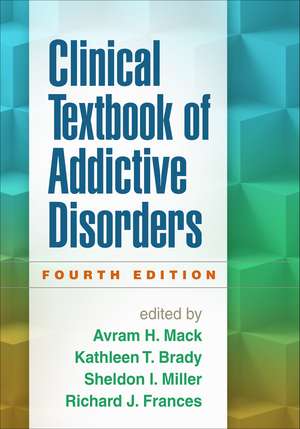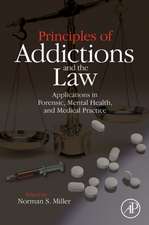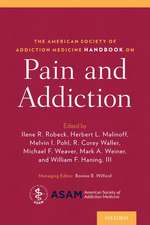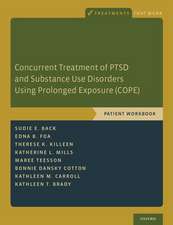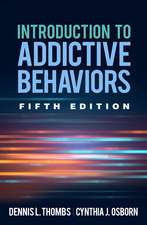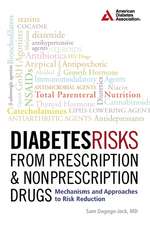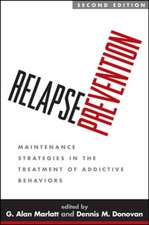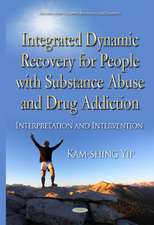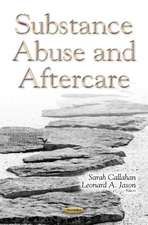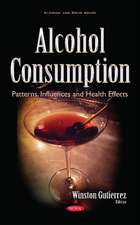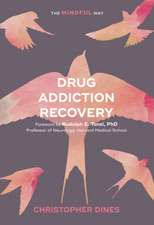Clinical Textbook of Addictive Disorders, Fourth Edition
Editat de Avram H. Mack, Kathleen T. Brady, Sheldon I. Miller, Richard J. Francesen Limba Engleză Hardback – 20 apr 2016
This state-of-the-science reference and text has given thousands of practitioners and students a strong foundation in understanding and treating addictive disorders. Leading experts address the neurobiology of addictions and review best practices in assessment and diagnosis. Specific substances of abuse are examined in detail, with attention to real-world clinical considerations. Issues in working with particular populations--including polysubstance abusers, culturally diverse patients, older adults, chronic pain sufferers, and others--are explored. Chapters summarize the theoretical and empirical underpinnings of widely used psychosocial and pharmacological treatments and clearly describe clinical techniques.
New to This Edition
*Incorporates a decade's worth of major advances in research and clinical practice.
*Updated for DSM-5.
*Many new authors; extensively revised with the latest information on specific biological mechanisms, substances, populations, and treatments.
*Chapter on motivational interviewing.
New to This Edition
*Incorporates a decade's worth of major advances in research and clinical practice.
*Updated for DSM-5.
*Many new authors; extensively revised with the latest information on specific biological mechanisms, substances, populations, and treatments.
*Chapter on motivational interviewing.
Preț: 846.64 lei
Preț vechi: 891.20 lei
-5% Nou
Puncte Express: 1270
Preț estimativ în valută:
162.03€ • 168.53$ • 133.76£
162.03€ • 168.53$ • 133.76£
Carte tipărită la comandă
Livrare economică 14-28 aprilie
Preluare comenzi: 021 569.72.76
Specificații
ISBN-13: 9781462521692
ISBN-10: 146252169X
Pagini: 730
Dimensiuni: 178 x 254 x 46 mm
Greutate: 1.54 kg
Ediția:Revised.
Editura: Guilford Publications
Colecția Guilford Press
ISBN-10: 146252169X
Pagini: 730
Dimensiuni: 178 x 254 x 46 mm
Greutate: 1.54 kg
Ediția:Revised.
Editura: Guilford Publications
Colecția Guilford Press
Cuprins
I. Foundations of Addiction
1. Neurobiology of Substance Use Disorders: Implications for Treatment, Thomas R. Kosten & Colin N. Haile
2. Historical and Social Context of Psychoactive Substance Disorders, Joseph Westermeyer
II. Assessment of Addiction
3. Diagnostic Assessment of Substance Abusers, Deborah Hasin & Bari Kilcoyne
4. Laboratory Testing for Substances of Abuse, D. Andrew Baron & David A. Baron
III. Substances of Abuse
5. Alcohol, Ed Nace
6. Nicotine Dependence, David Kalman, Amy Harrington, Joseph DiFranza, Lori Pbert, & Douglas Ziedonis
7. Opioids, Sudie E. Back, Jenna L. McCauley, Kelly S. Barth, & Kathleen T. Brady
8. Cannabis, Alicia R. Murray & Frances R. Levin
9. Hallucinogens and Inhalants, Stephen Ross & Avram H. Mack
10. Caffeine, Laura M. Juliano & Greta Bielacyzc Raglan
11. Stimulants, Richard Rawson, Larissa Mooney, & Walter Ling
12. Cocaine, Evaristo Akerele & Niru Nahar
13. Sedatives/Hypnotics and Benzodiazepines, Robert L. DuPont, William M. Greene, & Caroline M. DuPont
IV. Special Populations
14. Polysubstance Use, Abuse, and Dependence, Richard N. Rosenthal, Petros Levounis, & Abigail J. Herron
15. Co-Occurring Substance Use Disorders and Other Psychiatric Disorders, Benjamin C. Silverman, Lisa M. Najavits, Roger D. Weiss
16. Gambling Disorder and Other "Behavioral" Addictions, Liana R. N. Schreiber, Marc N. Potenza, & Jon E. Grant
17. Substance Abuse in Minority Populations, John Franklin
18. Addiction in the Workplace, Laurence Westreich
19. Forensic Approaches to Substances of Abuse, Avram H. Mack
20. Patients with Chronic Pain and Opioid Misuse, Deborah L. Haller & Sidney H. Schnoll
21. Substance Use among Older Adults, Steve Koh, Robert Gorney, Nicolas Badre, & Dilip Jeste
22. HIV/AIDS and Substance Use Disorders, Cheryl Ann Kennedy & Steven J. Schleifer
23. Women and Substance Abuse, Dawn E. Sugarman, Christina Brezing, & Shelly F. Greenfield
24. Substance Use Disorders in Adolescence, Oscar G. Bukstein & Yifrah Kaminer
V. Treatments for Addictions
25. Matching and Differential Therapies: Providing Substance Abusers with Appropriate Treatment, Kathleen M. Carroll & Brian D. Kiluk
26. Individual Psychodynamic Psychotherapy, Lance M. Dodes & Edward J. Khantzian
27. Cognitive Therapy, Judith S. Beck, Bruce S. Liese, & Lisa M. Najavits
28. Group Therapy, Self-Help Groups, and Network Therapy, Marc Galanter
29. Family Therapy Approaches, Edward Kaufman
30. Motivational Interviewing, Jennifer L. Smith, Kenneth M. Carpenter, R. Morgan Wain, & Edward V. Nunes
31. Dialectical Behavior Therapy for Individuals with Borderline Personality Disorder and Substance Use Disorders, Dorian Hunter, M. Zachary Rosenthal, Thomas R. Lynch, and Marsha M. Linehan
32. Psychopharmacological Treatments, Larissa J. Mooney & Elinore F. McCance-Katz
Index
1. Neurobiology of Substance Use Disorders: Implications for Treatment, Thomas R. Kosten & Colin N. Haile
2. Historical and Social Context of Psychoactive Substance Disorders, Joseph Westermeyer
II. Assessment of Addiction
3. Diagnostic Assessment of Substance Abusers, Deborah Hasin & Bari Kilcoyne
4. Laboratory Testing for Substances of Abuse, D. Andrew Baron & David A. Baron
III. Substances of Abuse
5. Alcohol, Ed Nace
6. Nicotine Dependence, David Kalman, Amy Harrington, Joseph DiFranza, Lori Pbert, & Douglas Ziedonis
7. Opioids, Sudie E. Back, Jenna L. McCauley, Kelly S. Barth, & Kathleen T. Brady
8. Cannabis, Alicia R. Murray & Frances R. Levin
9. Hallucinogens and Inhalants, Stephen Ross & Avram H. Mack
10. Caffeine, Laura M. Juliano & Greta Bielacyzc Raglan
11. Stimulants, Richard Rawson, Larissa Mooney, & Walter Ling
12. Cocaine, Evaristo Akerele & Niru Nahar
13. Sedatives/Hypnotics and Benzodiazepines, Robert L. DuPont, William M. Greene, & Caroline M. DuPont
IV. Special Populations
14. Polysubstance Use, Abuse, and Dependence, Richard N. Rosenthal, Petros Levounis, & Abigail J. Herron
15. Co-Occurring Substance Use Disorders and Other Psychiatric Disorders, Benjamin C. Silverman, Lisa M. Najavits, Roger D. Weiss
16. Gambling Disorder and Other "Behavioral" Addictions, Liana R. N. Schreiber, Marc N. Potenza, & Jon E. Grant
17. Substance Abuse in Minority Populations, John Franklin
18. Addiction in the Workplace, Laurence Westreich
19. Forensic Approaches to Substances of Abuse, Avram H. Mack
20. Patients with Chronic Pain and Opioid Misuse, Deborah L. Haller & Sidney H. Schnoll
21. Substance Use among Older Adults, Steve Koh, Robert Gorney, Nicolas Badre, & Dilip Jeste
22. HIV/AIDS and Substance Use Disorders, Cheryl Ann Kennedy & Steven J. Schleifer
23. Women and Substance Abuse, Dawn E. Sugarman, Christina Brezing, & Shelly F. Greenfield
24. Substance Use Disorders in Adolescence, Oscar G. Bukstein & Yifrah Kaminer
V. Treatments for Addictions
25. Matching and Differential Therapies: Providing Substance Abusers with Appropriate Treatment, Kathleen M. Carroll & Brian D. Kiluk
26. Individual Psychodynamic Psychotherapy, Lance M. Dodes & Edward J. Khantzian
27. Cognitive Therapy, Judith S. Beck, Bruce S. Liese, & Lisa M. Najavits
28. Group Therapy, Self-Help Groups, and Network Therapy, Marc Galanter
29. Family Therapy Approaches, Edward Kaufman
30. Motivational Interviewing, Jennifer L. Smith, Kenneth M. Carpenter, R. Morgan Wain, & Edward V. Nunes
31. Dialectical Behavior Therapy for Individuals with Borderline Personality Disorder and Substance Use Disorders, Dorian Hunter, M. Zachary Rosenthal, Thomas R. Lynch, and Marsha M. Linehan
32. Psychopharmacological Treatments, Larissa J. Mooney & Elinore F. McCance-Katz
Index
Recenzii
"This extraordinarily well-written, clinically relevant, evidence-based work provides guidance and clarity to treatment professionals. Thousands of patients and practitioners will benefit from its contents, and treatment outcomes will be greatly improved."--Louis E. Baxter, Sr., MD, FASAM, Executive Medical Director, Professional Assistance Program of New Jersey, Inc.; past president, American Society of Addiction Medicine
"This book is ideal for therapists and researchers, as well as students and trainees new to the field. Science and clinical practice issues are presented in a balanced and inclusive manner. Now in its fourth edition, the volume retains all of its originally positive features and adds timely and new information essential to better understanding and treating addictions."--Nancy M. Petry, PhD, Professor of Medicine, UConn Health
"This book is unique in providing high-quality, comprehensive, and up-to-date coverage of all major topics in addictions, with broad applicability for training psychiatrists, clinical psychologists, and other mental health professionals. It is an excellent text for graduate or other professional courses in assessment and treatment of substance use disorders."--Stephen A. Maisto, PhD, Department of Psychology, Syracuse University
"The book enriches the reader's understanding of drugs, their interactions, and ways to enhance screening and diagnosis, including how to overcome interview barriers when working with alcohol and drug users. There is good coverage of brain processes associated with substance use and their implications for treatment. The figures and tables contribute greatly to understanding each chapter. This would be a useful text for my graduate-level Addictions course; I would also recommend it as a supplementary reference in my undergraduate Mental Health course."--Cynthia Bostick, PMHCNS-BC, PhD, School of Nursing, California State University, Dominguez Hills
-An important, accessible, comprehensive book; I commend the authors and editors for their work....This is a useful text for teaching about the addictive disorders in many fields, including medicine, psychology, social work, counseling, and nursing. (on the third edition)--PsycCRITIQUES, 12/21/2015ƒƒExcellent....The authors provide us with a textbook that is quick to read and easy to digest. I have found over the years that residents enjoy this book and can learn from it readily....The clinician will find this textbook useful and handy in a busy practice. As a certified addictions specialist, I have found it useful in my day-to-day practice. I highly recommend this book and will certainly keep a copy of it on my shelf. (on the second edition)--American Journal of Psychiatry, 8/1/1999ƒƒAs a student in the mental-health field, this book has already been helpful in my studies....A valuable resource to anyone who works or is thinking about working in the addiction-treatment field. (on the third edition)--Addiction Today, 7/1/2011"This book is ideal for therapists and researchers, as well as students and trainees new to the field. Science and clinical practice issues are presented in a balanced and inclusive manner. Now in its fourth edition, the volume retains all of its originally positive features and adds timely and new information essential to better understanding and treating addictions."--Nancy M. Petry, PhD, Professor of Medicine, UConn Health
"This book is unique in providing high-quality, comprehensive, and up-to-date coverage of all major topics in addictions, with broad applicability for training psychiatrists, clinical psychologists, and other mental health professionals. It is an excellent text for graduate or other professional courses in assessment and treatment of substance use disorders."--Stephen A. Maisto, PhD, Department of Psychology, Syracuse University
"The book enriches the reader's understanding of drugs, their interactions, and ways to enhance screening and diagnosis, including how to overcome interview barriers when working with alcohol and drug users. There is good coverage of brain processes associated with substance use and their implications for treatment. The figures and tables contribute greatly to understanding each chapter. This would be a useful text for my graduate-level Addictions course; I would also recommend it as a supplementary reference in my undergraduate Mental Health course."--Cynthia Bostick, PMHCNS-BC, PhD, School of Nursing, California State University, Dominguez Hills
Notă biografică
Avram H. Mack, MD, is Associate Chair for Quality and Safety at the Children’s Hospital of Philadelphia, where he is a practicing psychiatrist with a focus on substance use disorders and forensic, child, adult, and consultation–liaison psychiatry. Dr. Mack leads efforts on quality and patient safety and has had extensive experience as a teacher and administrator in undergraduate and graduate medical education for trainees and staff at the University of Pennsylvania, the Children’s Hospital of Philadelphia, and previously at Georgetown University. He is board-certified in general psychiatry, child and adolescent psychiatry, forensic psychiatry, and addiction medicine and presents, publishes, and testifies extensively regarding substance abuse. A past president of the Washington Psychiatric Society, he served on the board of directors of the American Psychiatric Association and on the Impaired Physicians Committee of the Medical Society of the District of Columbia. A distinguished Fellow of the American Psychiatric Association and a Fellow of the American College of Psychiatrists, Dr. Mack is a recipient of the Education Award presented by the Association for Academic Psychiatry in recognition of his efforts in advancing the patient safety movement within psychiatry.
Kathleen T. Brady, MD, PhD, is Distinguished University Professor and Director of the South Carolina Clinical and Translational Research Institute at the Medical University of South Carolina. Her interests include drug and alcohol abuse/addiction and comorbid conditions. A board-certified psychiatrist, Dr. Brady leads numerous research projects and served as president of the American Academy of Addiction Psychiatry, a member of the Scientific Advisory Council of the National Institute on Drug Abuse, and a board member of the College on Problems of Drug Dependence. She has authored over 300 publications; presented at conferences, grand rounds, and symposia; and received numerous awards.
Sheldon I. Miller, MD, until his death in 2011, was Emeritus Professor of Psychiatry and former Chairman of the Department of Psychiatry and Behavioral Sciences at Northwestern University Feinberg School of Medicine. Recognized as a national leader in addiction psychiatry, he was a cofounder of the American Academy of Addiction Psychiatry. Dr. Miller was the author of more than 100 publications and Editor-in-Chief of the American Journal on Addictions. He served on the Board of Directors of the Accreditation Council for Graduate Medical Education and the American Board of Emergency Medicine and was a Distinguished Fellow of the American Psychiatric Association and a member of the Group for the Advancement of Psychiatry.
Richard J. Frances, MD, is Clinical Professor of Psychiatry at New York University School of Medicine and Adjunct Professor at Rutgers New Jersey Medical School. He maintains a private practice in New York and was instrumental in the recognition of addiction psychiatry as a medical subspecialty. Board-certified in psychiatry and addiction psychiatry, Dr. Frances was a cofounder and first president of the American Academy of Addiction Psychiatry, Director of Education at the University of Medicine and Dentistry of New Jersey (now part of Rutgers Biomedical and Health Sciences), Chair of the Department of Psychiatry at Hackensack University Medical Center, and President and Medical Director of Silver Hill Hospital. He has also held leadership positions at New York Hospital–Cornell Medical Center and has a special interest in addiction, with a focus on impaired professionals.
Kathleen T. Brady, MD, PhD, is Distinguished University Professor and Director of the South Carolina Clinical and Translational Research Institute at the Medical University of South Carolina. Her interests include drug and alcohol abuse/addiction and comorbid conditions. A board-certified psychiatrist, Dr. Brady leads numerous research projects and served as president of the American Academy of Addiction Psychiatry, a member of the Scientific Advisory Council of the National Institute on Drug Abuse, and a board member of the College on Problems of Drug Dependence. She has authored over 300 publications; presented at conferences, grand rounds, and symposia; and received numerous awards.
Sheldon I. Miller, MD, until his death in 2011, was Emeritus Professor of Psychiatry and former Chairman of the Department of Psychiatry and Behavioral Sciences at Northwestern University Feinberg School of Medicine. Recognized as a national leader in addiction psychiatry, he was a cofounder of the American Academy of Addiction Psychiatry. Dr. Miller was the author of more than 100 publications and Editor-in-Chief of the American Journal on Addictions. He served on the Board of Directors of the Accreditation Council for Graduate Medical Education and the American Board of Emergency Medicine and was a Distinguished Fellow of the American Psychiatric Association and a member of the Group for the Advancement of Psychiatry.
Richard J. Frances, MD, is Clinical Professor of Psychiatry at New York University School of Medicine and Adjunct Professor at Rutgers New Jersey Medical School. He maintains a private practice in New York and was instrumental in the recognition of addiction psychiatry as a medical subspecialty. Board-certified in psychiatry and addiction psychiatry, Dr. Frances was a cofounder and first president of the American Academy of Addiction Psychiatry, Director of Education at the University of Medicine and Dentistry of New Jersey (now part of Rutgers Biomedical and Health Sciences), Chair of the Department of Psychiatry at Hackensack University Medical Center, and President and Medical Director of Silver Hill Hospital. He has also held leadership positions at New York Hospital–Cornell Medical Center and has a special interest in addiction, with a focus on impaired professionals.
Descriere
This state-of-the-science reference and text has given thousands of practitioners and students a strong foundation in understanding and treating addictive disorders. Experts address the neurobiology of addictions and review best practices in assessment and diagnosis.
